When Paul Stutzman lost his wife of 32 years to breast cancer, he didn’t know where to turn. So he gave up a four-decade career in the restaurant business and headed for Springer Mountain. In the book Hiking Through: Finding Peace and Freedom on the Appalachian Trail, he recounts his loss, and how he healed through his 2,178-mile thru-hike.

What is the key to letting go and leaving life behind? Stop worrying. Everything I worried about on the trail never came to pass. It’s a special place where things always seem to work out. The trail has a special community that will always help you, and it’s a place to learn to trust yourself.
Why is the trail a proper place to deal with grief? You have to face yourself. You have no choice. You put behind the job and normal stresses of daily life and allow the grief hidden in the recesses of your mind to come forward. I would spend nights in my tent, physically exhausted, just going through my mind. It gives you an opportunity to inventory your life and deal with demons that are haunting you. It’s a place to finally realize who you are.
What was your turning point on the A.T.? I limped into Daleville, Virginia, with brutal shin splints. I got a call from my daughter saying she was going into labor, and she wanted me to come home. My daughter’s mother had passed away, and she wanted a parent there. But I knew if I went home, I wouldn’t come back. After struggling with the decision, I kept hiking. Despite my physical pain and my daughter giving birth, I needed to finish the trail to move forward with my life.
After using the trail to deal with profound loss, how has your life changed since? I left a job of 40 years and headed straight for the trail, because I couldn’t tolerate being retired. When I touched the sign at Katahdin, it really hit me that I had to go home with nothing to do. It was a brutal slap in the face. Once I started writing the book, I had purpose again. Now I do a lot of lectures and talks; I’m on a completely different path.
I left a job of 40 years and headed straight for the trail, because I couldn’t tolerate being retired. When I touched the sign at Katahdin, it really hit me that I had to go home with nothing to do. It was a brutal slap in the face. Once I started writing the book, I had purpose again. Now I do a lot of lectures and talks; I’m on a completely different path.







